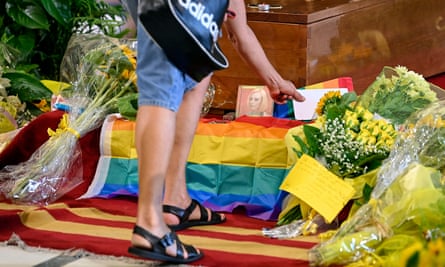In Italy’s week of mourning for Raffaella Carrà, one image summed up her universal appeal: a rainbow flag – the symbol of the LGBT movement – next to her coffin in a Catholic church.
Carrà, who died on Monday aged 78, was a cultural institution in her home country, regarded as its “best-loved woman”. The queen of light entertainment TV, she also acted and topped the music charts of Europe and South America with pioneering, sex-positive pop music.
On Friday, thousands of people accompanied her coffin through the streets of Rome to the church of Santa Maria in Ara Coeli for her funeral, which was broadcast live on the public television channel RAI.

“Raffaella has left us. She has gone to a better world, where her humanity, her unmistakable laugh and her extraordinary talent will shine forever,” said Carrà’s long-term partner, Sergio Japino.
Condolences poured in from the worlds of TV, cinema, sport and politics, and from the millions of admirers who followed every move of her 60-year career.
“My heart is broken,” said 54-year-old Giusi Angileri, from Marsala. “Raffaella Carrà was the joy of Saturday night. My mother woke me every morning for school singing her songs. La Carrà, for me, represented a sweet awakening. She gave me a smile, even if I had to get out of bed to go to school.”
Born in Bologna in 1943, Carrà studied dance but started her career as an actor in the “peplum” genre of Italian historical epic films. After a stint in the US where she acted with Frank Sinatra in the adventure film Von Ryan’s Express, she returned to Italy and became a host on the Broadway-inspired television variety show Canzonissima, which would frequently feature song-and-dance numbers performed by Carrà.
In the conservative Italy of the 1970s, Carrà caused one of the biggest scandals in the history of Italian television when she appeared on stage in front of millions of viewers baring her belly button. The episode infuriated the Vatican and the leaders of the Christian Democracy party, but they could not do anything to stop her.

Conservative Italians were also helpless when in 1978, Carrà released the album Raffaella, which contained a song called Luca that detailed the homophobic prejudices and violent attacks endured by gay people in Italy in the 70s.
In the days following Carrà’s death, the Italian press widely reported on a 2020 Guardian article by Angelica Frey in which Frey discussed how Carrà’s songs had revolutionised Italian entertainment – and given women agency in the bedroom.

“Her outfits and routines were regarded as racy by the era’s standards and she was occasionally censored, but her career endured throughout the 1970s,” Frey wrote. “She became regarded as a feminist icon across Europe. The original Italian version of the song, Do It, Do It Again [a 1978 hit in the UK] encourages women to take control during sex.”
Francesco Vezzoli, the curator of an exhibition of 1970s Italian television for the Fondazione Prada in 2017, said Carrà had done “more to liberate women than many feminists”.
There has also been an outpouring of grief and love in Spain, where Carrà lived and worked in the 1970s as the country emerged from the Franco dictatorship, telling a Spanish interviewer in 1977 that she “always voted Communist”.
In 2017 she was named a global gay icon at World Pride in Madrid, and the following year she was made a dame of the Order of Civil Merit by King Felipe.

“Spain’s an old love,” she said at the time. “I’ve sung in all its cities and what I like about its people is that when they meet me they say: ‘You’re one of us.’ Spain is like my second homeland.”
Further proof of the country’s enduring affection for the singer is evident in plans to name a square in Madrid in her honour. Next Wednesday the Más Madrid party will propose the creation of the Plaza Raffaela Carrà in the centre of the capital.
“She represents freedom for many generations, for grandmothers and grandfathers, for mothers and fathers and also for younger people,” the party said. “She was one of the first public figures to talk about sexual freedom and she was an inspirational figure as both a music and TV star and as an international gay icon. Raffaella Carrà was always deeply linked to Madrid, a city where she said she felt free.”
Spain’s prime minister, Pedro Sánchez, paid tribute on Twitter, calling her “a woman who inspired happiness, courage and commitment in successive generations” and adding: “Her music lifted our hearts; her free spirit filled our souls.”
